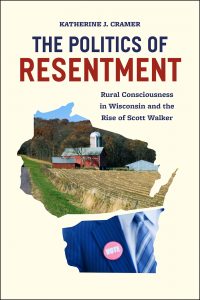Katherine J. Cramer on politicizing rural consciousness

In a recent piece for Vox, Katherine J. Cramer outlined some of the arguments she makes in The Politics of Resentment: Rural Consciousness in Wisconsin and the Rise of Scott Walker, which draws upon years of research on Wisconsin’s shifting electorate to analyze the role played by rural consciousness, and the ongoing influence of place-based identities in politics.
Here’s part of Cramer’s takeaway:
Once I passed out my business cards, handed out tokens of appreciation like Badger football schedules, and turned on my recorder, I asked them, “What are the big concerns of people in this community?”
Regardless of geography, people in most of these communities talked about their concerns about health care, jobs, and taxation. But in the rural places and small towns, people expressed a deeply felt sense of not getting their “fair share” — defined in different ways. They felt that they didn’t get a reasonable proportion of decision-making power, believing that the key decisions were made in the major metro areas of Madison and Milwaukee, then decreed out to the rest of the state, with little listening being done to people like them.They also thought that they didn’t get their fair share of tax money. To them, too much of it went to the cities, to “undeserving” people. The undeserving included racial minorities on welfare but it also included lazy urban professionals like me working desk jobs and producing nothing more than ideas. (According to my analysis of state and federal 2010 dollars, rural counties in Wisconsin do not receive fewer dollars per capita than do urban counties, and they don’t receive a lower share of what they pay in taxes than do urban counties. But rural counties do have higher unemployment and poverty and lower median household incomes.)
But perhaps most significantly, the people I talked with thought that they were not getting their fair share of respect. They perceived that in the rare cases that people in the cities paid any attention to people in places like theirs, they ridiculed rural folks as uneducated racists.
To read the Vox piece in full, click here.
To read more about The Politics of Resentment, click here.